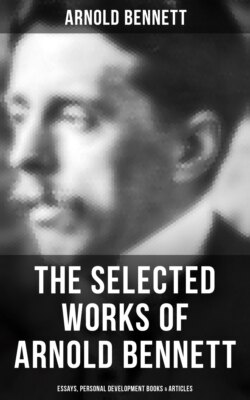Читать книгу The Selected Works of Arnold Bennett: Essays, Personal Development Books & Articles - Arnold Bennett - Страница 41
На сайте Литреса книга снята с продажи.
Non-Fictional Writing.
ОглавлениеThe well-known division of authors into those who want to write because they have something to say, and those who merely want to write, is peculiarly applicable to the non-fictional field. To the former class belong the authors of the best histories, biographies, travel books, theological books, and scientific, critical, and technical treatises. The latter class is composed of a heterogeneous crowd of compilers, rearrangers, and general literary middlemen anxious to turn an honest penny. The former class seldom needs advice of an expert nature, for the troubling consciousness of a "message” almost invariably connotes the ability to deliver that message with all needful lucidity and conviction; no one is so sure of achieving the aims of the literary craftsman as the man who has something to say and wishes to say it simply and have done with it. The latter class needs direction, for it has none of its own; and its principal desire is to make money, whereas with the former class the financial side of the work is usually secondary. Many great works of fiction have been accomplished because the authors wanted money, and wanted it badly and in large quantities, but this can be said of extremely few great non-fictional works.
The literary aspirant who merely wants to write, and who cannot write fiction, will have to be content with the prospect of a smaller income than he could derive from the imaginative gift did he possess it But nevertheless, with ingenuity, he can make money. Popular biographies—especially of princes, artists, and scoundrels, anecdotic histories of places, people, and pastimes—especially of pastimes, smeltings of the ore of antique magazines, diaries, and other records, guides to everything past, present, and 'to come, and descriptions of travel undertaken in order to be described—the field open to the activities of the ingenious hack is well-nigh boundless; in my opinion it is yet far from being fully exploited. The demand for the Anecdote glorified in cloth covers is prodigious and insatiable, and if the reward of the anecdote is not overpowering, neither is the uncreative labour of serving it up. Among the most remunerative forms of non-fictional writing is the “gossipy” book dealing lightly with a past epoch, not too remote. A well contrived chitchat on the Reign of Terror, or the Age of Johnson, or the Regency, garnished with reproductions of a few old prints, is always welcomed by the libraries. Such volumes are put forth in imposing ornamental exteriors at a fairly high price, and a twenty per cent royalty on them means a satisfactory result to the author. It is not uncommon for Mudies alone to buy two hundred copies of a half-guinea, sixteen-shilling, or guinea book of glorified anecdote. Taking the lowest price, and assuming that a thousand copies are sold, the return to the ingenious compiler is a hundred pounds. The profits are frequently more, and not often less. The popular biography and the popular monograph do not, I am afraid, pay quite so well, because publishers have a preference for buying them from the author outright at a rate which probably does not average more than one pound per thousand words. But even this is not precisely despicable when one considers that the only qualifications necessary to the anecdotist and the compiler are a brisk, clear style and some skill in the arrangement of material.
The subject of popular non-fictional writing for money is so wide and various that it is impossible to select for discussion any career that would be fairly typical. The success of the book-concocter (I use the term without disrespect) depends on his invention and versatility, and his aptitude to foresee the changes of public taste. At best he is not likely to acquire riches; but, provided always that he has access to a great library, he may materially add to his income by intermittently concocting. He should not depend wholly on this branch of literature for a livelihood, although I admit that it might be possible, by using several pseudonyms and several publishers and an inordinate amount of research for topics, to earn as much in strenuous, tireless concoction as a second-rate novelist earns without undue exertion.
